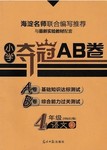题目内容
Last week, while visiting my dad with my daughter, we went to a restaurant for dinner. When we were seated, my dad asked the waitress if there were any soldiers eating at the restaurant. Then waitress said there was a soldier having dinner with his friend. My dad told the waitress to tell the soldier and his friend that their dinner was paid for! He also said that he did not want to be known as the benefactor(施主).
Then waitress later commented on my dad’s thoughtful behavior saying that she had never seen anything like this before. At a local college, she had studied opera and so she used this to thank my dad by performing a piece from The Pearl Fisherman. Her voice brought me to tears because it sounded perfect!
After a while, the soldier appeared at our table (I don’t know how he knew my dad paid the bill for him.) and said that he would be sent to the front the next morning and that he could not leave this country without saying “thanks” to my dad. My dad replied that it was he who wanted to say “thanks”. They shook hands as the soldier left.
Before we left, the waitress came by again. She did a magic show as another way to show her “thanks” to my dad. Her show was really great. My dad left her a note with email address asking for her next performance time in addition to a $ 50 tip.
Everyone witnessed something exemplary(可作榜样的) in the human spirit that night. I can only hope to see more of this in the future.
1. What did the soldier do in response to the author’s father’s kindness?
A. He gave something to author’s dad.
B. He gave a big tip to the waitress.
C. He said thanks to the author’s dad in person.
D. He did a magic show for the author and her father.
2. The author considered her father’s action to be ____.
A. funny B. understandable
C. worthless D. honorable
3.Their passage mainly tells us that we should ____.
A. learn to be grateful to others
B. find ways to thank others
C. try to learn from each other
D. respect soldiers and waitresses
1.C
2.B
3.A
【解析】
试题分析:本文作者通过讲述他的父亲为一位士兵及其朋友的晚餐买单,并接受感谢的事,告诉了我们要学会对他人怀抱感恩之心。
1.细节理解题。从第三段中…said that he would be sent to the front the next morning and that he could not leave this country without saying “thanks” to my dad.可知,士兵在上前线之前一定要对我父亲表达感谢之情,故选C。
2.细节理解题。从最后一段Everyone witnessed something exemplary(可作榜样的) in the human spirit that night. I can only hope to see more of this in the future,可知作者希望见到更多这种现象,所以他对此是表示理解的,故选B。
3.主旨归纳题。本文通过讲述作者父亲为一位士兵及其朋友的晚餐买单,并接受感谢的事,告诉了我们要学会对他人怀抱感恩之心,故选A。
考点:考查叙事说理文阅读

 小学夺冠AB卷系列答案
小学夺冠AB卷系列答案 ABC考王全优卷系列答案
ABC考王全优卷系列答案